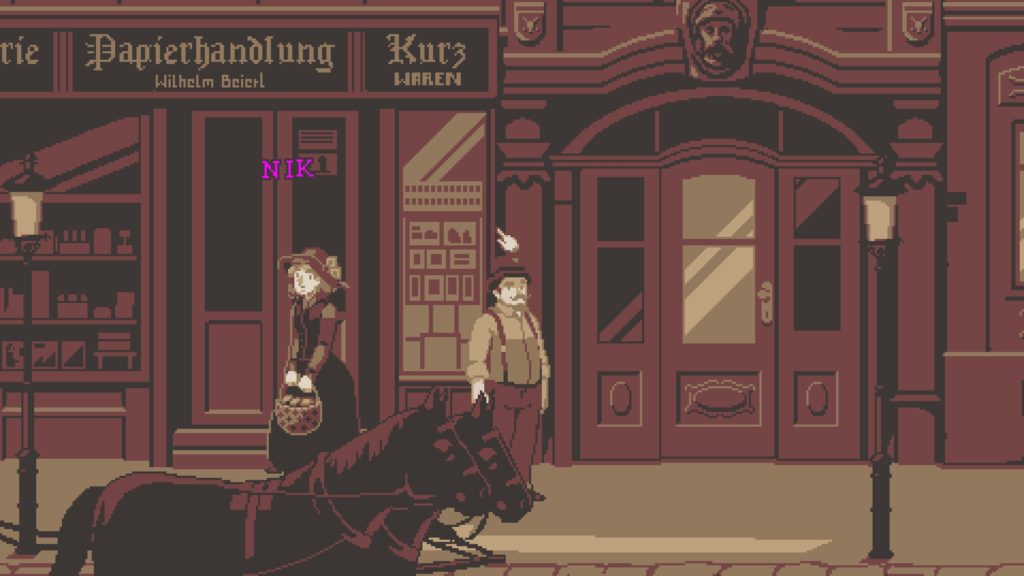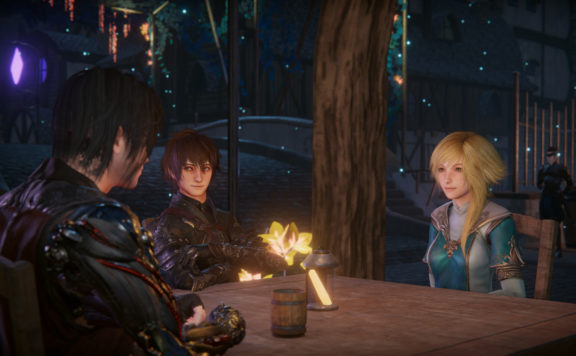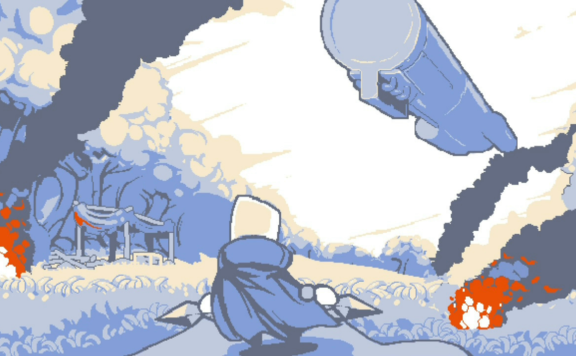The Viennese indie developer studio Mi’pu’mi Games has mainly been involved in commissioned projects in the past, among others most prominently supporting IO Interactive with the new episodic Hitman game. Now, it makes a name for itself with its own little gem of an episodic game. The Lion’s Song does not only send you to Vienna but also back in time to the beginning of the 20th century. Each episode you play a different fictional but vivid character and interact with some of the greatest minds in history, like Sigmund Freud or Gustav Klimt – and somehow everything is loosely connected. Now that the fourth and final episode has arrived, we went on this visually and musically inspiring journey. This is our The Lion’s Song review.
The Lion’s Song is available in various forms, as single episodes (or as a season pass) on Steam or as a total package on the Mac Store and mobile platforms (Apple and Android). For new players, the most striking feature is the unique visual style that perfectly fits the time it is set in. Pixel art and a very limited sepia-like color palette set the ambiance and the corner stone for the narrative tone, which easily pulls off a balancing act between melancholia and refreshing lightheartedness. Surprisingly enough, the graphical simplicity does not hold back the artists from supporting the emotions of the great dialogue writing visually, with believable gestures and facial expressions. The brilliant soundtrack is just the icing on the cake.

Creative Processes and Self-Realization
Despite the visual abstraction, the immersion is extremely high. This is owed to the fact that the real strength of the game lies in its narration and the topics it tries to tackle. The Lion’s Song is all about self-realization and the struggles and creative processes involved in getting there. As already mentioned, you are playing a different character each episode. The first three of them are all brilliant minds in their own way, while the fourth episode – as the name already tells – mainly brings “Closure”.
In the first episode, you accompany Wilma, a young composer, who has a career-defining concert ahead of her but struggles to find inspiration with all the stress involved. Therefore she seeks the remoteness of the Austrian mountains and you as a player compose the song with her, by drawing the inspiration from the surrounding nature. Gameplay wise this does not include the most sophisticated mechanics. There are no real riddles, mainly it’s just clicking around. Still, it feels like the creative process is captured in a unique way and you can actually influence the song that is composed in the end.
This is a recurring theme, but each episode has its own unique approach. For example, in the second episode you are playing the up starting painter Franz, and here it’s all about discovering the hidden layers of his portrait subjects’ personalities. It’s getting even more abstract in episode three when you have to solve a mathematical problem with mathematician Emma. Even there the thinking process and your search for the solution are shown in such a figurative way, using many analogies, that it is easy to follow.

Emotional Intensity and Choices
Although all episodes are very short – around one hour – they feel emotionally intense. The creative processes are only one part of the self-realization of these characters. They are given meaning by surrounding them with a believable context. We get to know the characters, their fears, their problems and their social environment. Only then we can really relate to their struggle. Emma’s dilemma, for example, is the most prominent one. She has a brilliant mind, but nobody takes her seriously because, in the beginning of the 20th century, this is a world dominated by men and women are supposedly not capable of such logical thinking.
However, there are also more subtle storylines. The connections between the characters – especially other characters they interact with – exist, but they stay well enough in the background to just add a nice additional layer, without distracting from the main stories. To make these connections a little bit more explicit, there is also a connection gallery where you can revisit each episode to see which connections you found and if there are more to discover.
Speaking of revisiting, even though The Lion’s Song breaks with certain conventions, it does give you the genre-typical decisions along the way. They do have an influence on the personal storylines of the characters. As these stories are so small and personal, the influence actually feels much more significant than in your typical scenario of “No matter which character you want to rescue, in the end, you anyway have to save the world”. After each episode, you can see the defining decisions and how many percents of the other players made the same choices. You can even jump back into the game to that point to change your decision, although that might break the immersion to some extent.

With all the praise there also has to be some nitpicking of course. As already mentioned, there is not much “game” in The Lion’s Song, and I don’t mean the length of four hours. While technically being a point and click adventure, there are no riddles or an inventory. It’s mainly dialogues, and even there your influence is limited to these few defining turning points in each game. The game does not deliver any excitement in the sense of challenges, only the emotional ups and downs of its protagonists. Instead it walks you through the narration in a very laid-back way. Obviously, that’s nothing negative in itself, just probably not everybody’s cup of tea. The English localization is very good by the way; you will even learn a few Viennese words like “Melange” or “Fräulein”. Mi’pu’mi Games has done a great job in capturing the special culture of its hometown in that era, be it the exaggerated formality or the dry humor. Due to the restricted budget, there is however no voice acting (in any language).
Final Thoughts
As I am from Vienna myself, it is especially easy for me to connect with this game. However I do believe that it works for everyone who has a liking for a calm but emotional narration that tries to dig deeper into its protagonists’ minds and feelings. The setting of the historical Vienna together with the distinctive art style are an enrichment, but the characters with their struggle to find themselves and the involvement of the player in the creative/intellectual process would even work on its own. Obviously, if you are searching for an action game, The Lion’s Song will not be for you. If you are still uncertain, the easiest way to check yourself is by trying out the first episode for free on Steam. The season pass costs $9.99 on Steam, while it’s around $5 for mobile. Personally, I slightly prefer the controls on PC, but the mobile version is ported well enough.
Score: 8.5/10
Pros:
- Unique approach to creative processes and self-realization
- Beautiful pixel art with sepia color palette
- Vienna in the beginning of the 20th century as a very special setting
- Believable characters
- Good localization
Cons:
- Little actual gameplay
- Not always enough interactivity
- Very focused on the storyline, hardly anything to explore
Note: Our copy of The Lion’s Song (Steam and Android) was provided by ICO Partners PR for review purposes.







